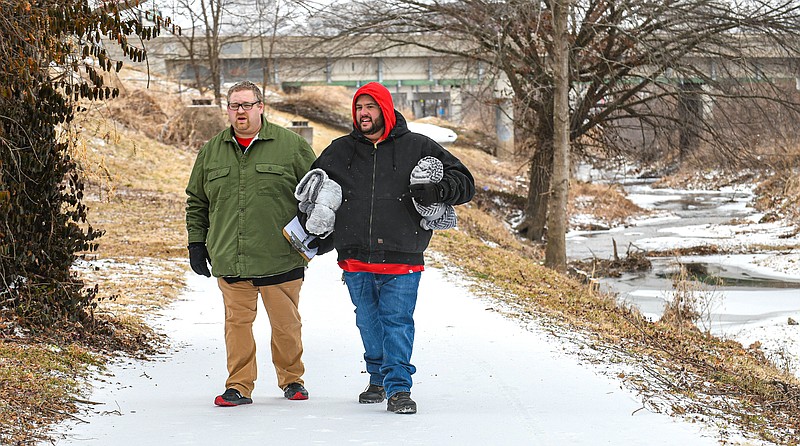An eviction moratorium was a lifeline for millions of households at the beginning of the pandemic. However, when the eviction ban ended in mid-2021, it left many who were housing insecure in a state of uncertainty.
Some Missouri lawmakers have proposed legislation this session that would restrict future eviction moratoriums in the state.
When the moratoriums were instituted by the Centers for Disease Control and Prevention in the early days of the COVID-19 pandemic, eviction proceedings based on the non-payment of rent were prohibited because many Americans had lost their jobs or faced an uncertain financial future.
Subsequently, some landlords and property owners went months without the stream of income they normally received from renters.
"The moratorium, in my opinion, was certainly unlawful," Rep. Chris Brown, R-Kansas City, said in a public hearing on his House Bill 1682, which states no court shall impose or enforce a moratorium on eviction proceedings unless specifically authorized by state law.
"It was a clear violation of contract law and property rights," Brown said.
Following the end of the federal eviction moratorium in August, some states and cities instituted their own moratoriums.
"I fear that going forwards, in particular, large municipalities with interest groups that put a lot of pressure on lawmakers, whether they be city council, whatever the case may be, that a municipality could put into place an eviction moratorium," Brown said. "That's kind of the purpose to a degree behind this bill."
Similar to HB 1682, HB 2360 would prohibit any city, town or village from imposing or enforcing a moratorium on eviction proceedings unless specifically authorized by state law. HB 2360, which is sponsored by Rep. Jim Murphy, R-St. Louis, has not yet moved to committee.
During the hearing for HB 1682, Brown noted there was money allocated for rental assistance when the eviction moratorium was put in place.
"However, of the $50 billion that was allocated for rental assistance, some states didn't get 5 percent out the door," he said.
Rep. Robert Sauls, D-Independence, later pointed out in the hearing for HB 1682 that funding was also specifically allocated to landlords during that time.
A representative with the Missouri Association of Realtors went on-record supporting HB 1682 on behalf of the interest group.
Jeremy Lafaver, with Empower Missouri, testified in opposition to HB 1682 at the hearing.
Empower Missouri identifies itself as a nonprofit that seeks "to secure basic human needs and equal justice for every person in our state through coalition-building and advocacy."
"I am not, and I don't think Empower Missouri is, oblivious to the fact that people throughout this pandemic have experienced a number of exceptionally difficult hardships, and I don't think landlords and investors are immune from that hardship," Lafaver said.
"When we look at the need of society and people to have homes and roofs over their heads, and families to have a safe place to call their home, and the need to make sure that investors are made whole within a handful of months for their rental property, they are different needs," he added.
Locally, many housing organizations noted they did see an influx of people in need of temporary shelter a few months after the eviction moratorium ended.
For the Salvation Army Center of Hope in Jefferson City, they saw an increase in the number of senior citizens who needed to use their services.
The most common way for people to transition out of temporary housing shelters into permanent housing is to find and maintain a steady income. For seniors, who often have no means of creating income, it presents an additional challenge.
People who qualify for senior housing come from a range of ages and backgrounds, said Brian Vogeler, director of the Center of Hope. Some senior housing accepts people as young as 55, while others make exceptions for physical or mental disabilities.
"A lot of times now, we go into this mode, 'OK, so we're going to get you some clothes. We're going to get your medications up to date,'" Vogeler said. "Let's go see ... do you see your doctor? Things like that."
Providing services to senior citizens can be significantly more expensive due to the additional cost of items like wheelchairs and walkers. In these situations, additional funding and resources are often need to provide adequate care.
The allocation of funding for those facing homelessness is largely determined from data in the Point-in-Time count, a requirement by the Department of Housing and Urban Development (HUD). The annual count, held in communities across the nation, seeks to measure different levels of sheltered and unsheltered homelessness, accounting for different demographics like age.
HUD defines unsheltered homelessness as situations where a person resides in a place not meant for human habitation, such as cars, parks, sidewalks and abandoned buildings. A sheltered homeless person may reside in places like an emergency shelter.
This year's Point-in-Time count, was the first since end of the eviction moratorium that begin during the COVID-19 pandemic, and shed light on the trends in homelessness among different groups, like senior citizens. Vogeler led Cole County's 2022 unsheltered Point-in-Time Count on Friday.
Friday night, Vogeler said his crew of volunteers encountered 16 unsheltered individuals on the streets of Cole County.
The total for the number for the sheltered count in Cole County will be data later compiled from many different area organizations including the Center of Hope, Rape and Abuse Crisis Center and Compass Health.
Click the links below to read the full bill:
• HB 1682: Eviction moratoriums
Sponsor: Rep. Chris Brown
• HB 2360: Eviction moratoriums
Sponsor: Rep. Jim Murphy

